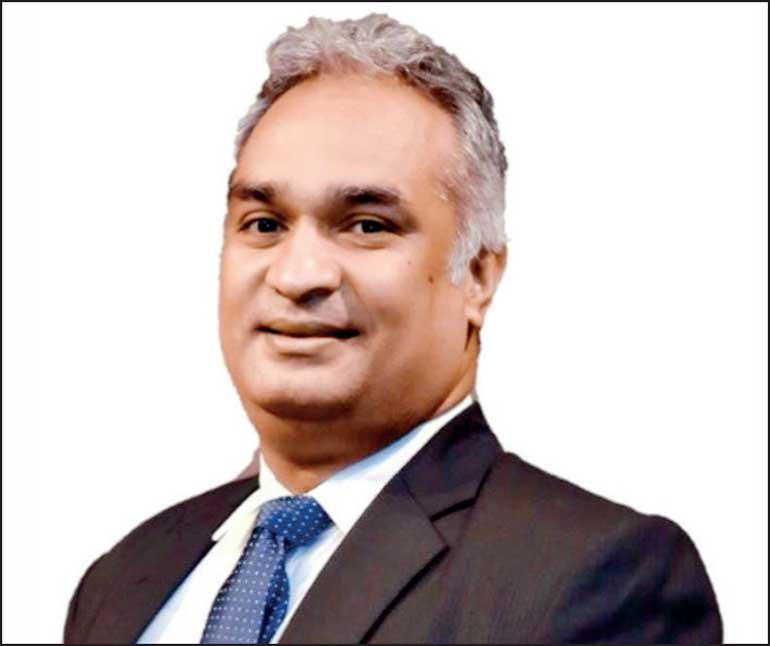Monday Feb 16, 2026
Monday Feb 16, 2026
Friday, 16 February 2024 00:10 - - {{hitsCtrl.values.hits}}

FITIS Chairman Indika De Zoysa

FITIS Vice President and LankaPay CEO Channa de Silva
The Federation of Information Technology Industry Sri Lanka (FITIS) yesterday expressed its strong support for LankaPay’s launch of the Unified Payments Interface (UPI) acceptance in the country, an initiative taken in partnership with the National Payment Corporation of India’s international arm NIPL.
FITIS Chairman Indika De Zoysa hailed LankaPay’s integration with NIPL to enable UPI payments at LankaQR merchants as a ‘significant step forward’ in fostering the nation’s small medium and micro business sectors’ digital transformation.
“This move clearly aligns with the objectives of the DigiGo.lk initiative of FITIS, aimed at revolutionising Sri Lanka’s business landscape by equipping over one million SMEs with vital digital capabilities, tools and resources, thereby positioning them competitively in the digital era,” added De Zoysa.
The UPI, a product of India’s payment innovation, stands as a real-time payment system facilitating instant electronic fund transfers directly between bank accounts through mobile applications. Its amalgamation with LankaPay’s national payment network extends many conveniences to Indian tourists and business travellers in Sri Lanka, empowering them to conduct seamless and cost-effective transactions at nearly 400,000 LankaQR merchants nationwide, utilising their Indian bank accounts.
The convergence of UPI with LankaQR signifies the fruition of an announcement made by India’s Prime Minister Narendra Modi in October last year at the inauguration of ferry services between Nagapattinam in India and Kankesanthurai in Sri Lanka, where he emphasised, ”This will not only boost bilateral trade and tourism but also contribute to strengthening our economic ties.”
FITIS Vice President and LankaPay CEO Channa de Silva revealed that the integration with UPI is only the initial stage in enabling seamless cross-border transactions with India.
”Via this integration with UPI, we are enabling inward QR payments utilising the existing national infrastructure, allowing Indian visitors and business travellers to scan and pay at LankaQR merchants. We plan to roll out the outward QR payments with India and RuPay card acceptance within Sri Lanka in the future, further enhancing cross-border transactions,” he added.
Indian tourists represent the second largest source market for Sri Lanka, accounting for 16.5% of total arrivals in January 2024, according to the Sri Lanka Tourism Development Authority. Eliminating currency exchange hassles and offering familiar payment methods like UPI can act as a powerful incentive to attract more Indian tourists and encourage them for longer stays and higher spending. The micro and small businesses associated with the tourism industry, be it souvenir shops and restaurants or transportation services and homestays, will benefit from this integration by being able to tap into a broader customer base, boost sales, and ultimately contribute to local economic growth.
“The NIPL and LankaPay integration will greatly contribute to the growth of Sri Lanka’s digital economy and we believe it will significantly contribute towards our goal of reaching a $ 15 billion digital economy contribution by 2030,” FITIS Chief De Zoysa said.
The integration of UPI with LankaQR marks a significant step towards a more interconnected, financially inclusive and digital Sri Lanka, ready to embrace the opportunities of the global digital economy and unlock numerous benefits for both consumers and businesses. Beyond convenience and cost savings through familiar UPI-enabled apps for Indian visitors and competitive rates for merchants, the UPI integration promises broader benefits. It will likely fuel tourism and trade and strengthen economic ties between the two nations. By enabling cashless transactions, this landmark initiative provides SME and micro businesses in Sri Lanka access to a wider Indian customer base and the formal financial system, which are vital for obtaining bank loans and credit facilities.
Most importantly, by facilitating transactions through the formal banking system, this integration combats informal and illegal money exchange channels such as ‘Undial’ and ‘Hawala’ while promoting transparency and ensuring financial stability, mitigating security and regulatory concerns. It will also help to attract much anticipated foreign exchange into Sri Lanka via formal banking channels, which is a direct benefit of enabling a digital economy.